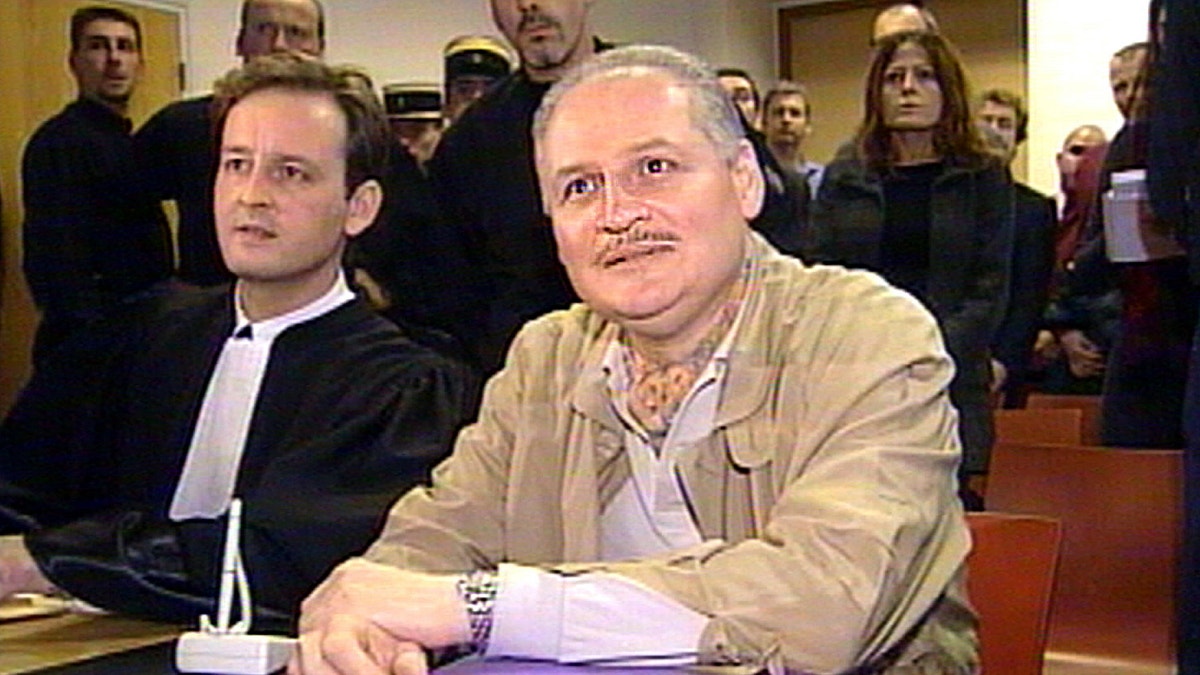
November 28, 2000 - FILE photo of Ilich Ramirez Sanchez, better known as "Carlos the Jackal" (R) seated next to his lawyer Francis Vuillemin (L) in court in Paris, France. (REUTERS)
PARIS – Carlos the Jackal, the flamboyant terrorist and self-proclaimed revolutionary who was once one of the Cold War's most wanted men, is appealing his life sentence for orchestrating bombings in France two decades ago. Carlos, whose real name is Ilich Ramirez Sanchez, is serving two life sentences in France for a triple murder in 1975 and for the bombings in 1982 and 1983 that killed 11 people and injured more than 140. He's been jailed since 1994 after French agents whisked him out of Sudan in a sack.
HIS LIFE
The world first caught sight of Carlos in the 1975 hostage-taking of OPEC oil ministers -- a young man standing on the runway wearing sunglasses, a black Che Guevara beret and a Pierre Cardin leather jacket, according to one of his numerous biographies. Intelligence agencies linked him to the 1976 Palestinian hijacking of a French jetliner to Entebbe, Uganda, the four bombings in France and other hijackings, explosions and deaths throughout the Cold War. By his own account Ramirez, who joined the Popular Front for the Liberation of Palestine and was affiliated with extreme-left European terror groups, killed 83 people over the years. "I'm a professional revolutionary. The world is my domain," he said at his 1997 trial.
For a time, his true identity was something of a mystery. In 1981 Mexican police claimed to have caught him, but their captive turned out to be merely an armed robber who bore a slight resemblance to the blurred image of a mustachioed young man who became the symbol of Cold War terrorism.
HIS LOVES
He threatened a campaign of terror against France in 1982 unless the government freed Magdalena Kopp, the West German left-wing radical who later became his first wife. That year, bombs exploded on two French express trains, a train station and in central Paris. In an autobiography after the couple split, Kopp claimed she was drawn to him even though his pet name for her was "the cow." France freed Kopp in 1985 and they had a daughter together. Ramirez divorced her and later was "married" in an unofficial ceremony to his French lawyer, Isabelle Coutant-Peyre, who remains with him to this day and was in Venezuela this week to lobby for his return there.
THE NICKNAME
His father, a wealthy communist lawyer, gave each of his three sons one name of Russian revolutionary leader Vladimir Ilyich Lenin. He got his nom de guerre after British tabloids learned that a copy of Frederick Forsyth's 1971 thriller, "Day of the Jackal," was found in one of his early London safe houses. The novel tells the story of a professional killer hired to assassinate French President Charles de Gaulle.
THE HUNT
For years, Carlos the Jackal was known only via a handful of hazy black-and-white photos. But the fall of Communism in 1989 spelled the end of his career, and Ramirez fled to Sudan, where he was captured by French agents with the apparent acquiescence of the Sudanese government. He's been jailed ever since -- something the outcome of this appeal is unlikely to change. The death of Venezuelan President Hugo Chavez, who called Ramirez a "revolutionary fighter" and helped keep him in cigars and Venezuelan coffee in prison, cost Carlos his most prominent supporter.
POP CULTURE
Carlos the Jackal was an inspiration for novels by Tom Clancy and Robert Ludlum, according to the British writer Colin Smith, who wrote a biography about the terrorist. Ramirez was the subject of the 2010 Golden Globe winning biopic "Carlos," a 5 1/2-hour film which he denounced as "a travesty of historical truth." It was one of many movies and television shows that refer to Ramirez. A version of an early photo of Carlos appears on an album cover of the British band Black Grape.
